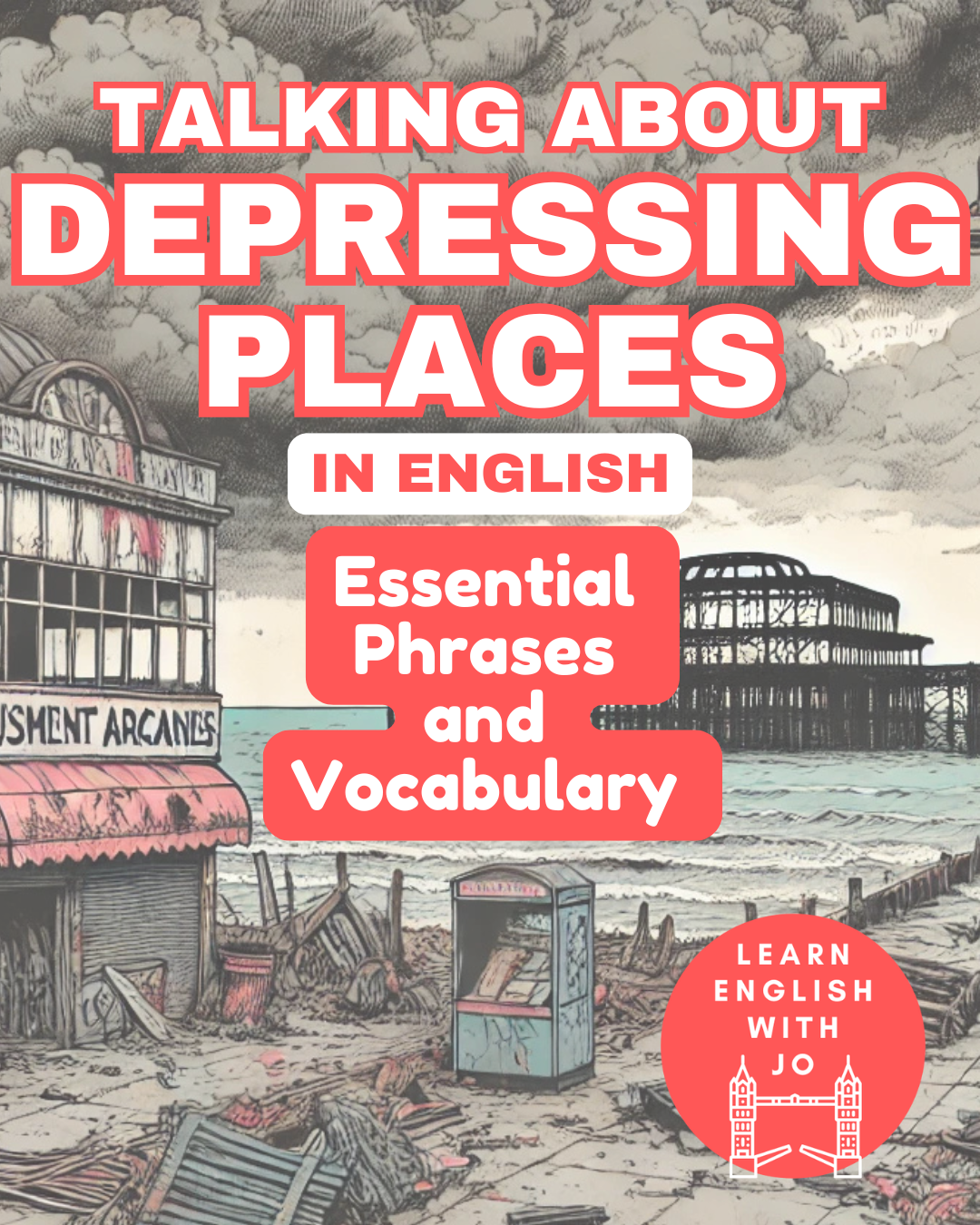Advanced English Phrases and Vocabulary for Describing Depressing Places.
When learning English, we often focus on language to talk about and to describe beautiful, charming locations and environments.
However, in the real word we also need the vocabulary to talk about slightly less appealing places; you know, the rather more grim or just downright miserable corners of the world. For example the UK may have beautiful, green countryside, dotted with picturesque villages, but it also has its fair share of run-down, shabby towns that have seen better days.
So today, I’ve come up with some advanced English vocabulary that you can use when describing places that are frankly, a bit depressing.
Try reading each definition and thinking of a place which it could be used to describe.
Phrases for Describing Grim Places
If you want to sound more natural and conversational when describing miserable places, here are some common phrases:
Seen better days – used when a place looks old, damaged, or neglected.
“This pub has seen better days – the furniture is falling apart.”Bit of a shithole (informal, rude) – used to describe a very rundown, unpleasant place.
We stayed in a bit of a shithole – the walls were crumbling and the plumbing barely worked.Run-down – describes a place that is badly maintained and in poor condition.
The neighbourhood is quite run-down, with lots of abandoned buildings.Past its prime – a place that used to be great but has deteriorated over time.
This shopping centre is past its prime – hardly any stores are left.Like a ghost town– a place that feels empty and abandoned.
The town centre is like a ghost town since all the shops closed.A dump – an informal way to say a place is dirty, messy, or badly maintained.
His flat was an absolute dump – rubbish everywhere and a horrible smell.Down-at-heel – looking shabby and uncared for, often due to poverty.
The once-glamorous hotel is now down-at-heel, with peeling paint and broken windows.A no-go area– a dangerous or unpleasant place to be.
“hat street is a no-go area after dark.Falling apart – used when a place is literally or figuratively deteriorating.
This house is falling apart – we need to renovate it completely.In the middle of nowhere – a phrase used when describing an extremely isolated place.
Their new house is in the middle of nowhere, miles from the nearest shop.
English Adjectives for Describing Remote or Desolate Places
Some places feel isolated, bleak, or even unsettling:
Remote – far away from other places and difficult to reach.
The remote village was hours away from the nearest town.Desolate – empty, abandoned, or uninhabited.
The desolate landscape stretched for miles without a single tree.Bleak – lacking warmth or charm, often cold and empty.
The weather was grey and the bleak countryside felt lonely.Dreary – dull, depressing, or lifeless.
The town looked dreary under the heavy rain.Barren – empty and lifeless, with no growth.
The barren desert stretched as far as the eye could see.
English Adjectives forDescribing Run-Down or Neglected Places
Some places have seen better days and now appear worn or uncared for:
Dilapidated – in a state of disrepair or ruin.
The dilapidated factory had shattered windows and crumbling walls.Shabby – in poor condition due to neglect.
The once-grand hotel had become a shabby, run-down building.Derelict – abandoned and in very poor condition.
The derelict warehouse was covered in graffiti and weeds.Tattered – ragged and torn, often referring to buildings or fabric.
The tattered curtains barely covered the broken windows.Ramshackle – badly constructed or maintained, likely to collapse.
The ramshackle hut barely stood against the wind.
English Adjectives forDescribing Unpleasant or Oppressive Places
Some places feel oppressive, suffocating, or uncomfortable:
Gloomy – dark, depressing, and lacking light.
The gloomy alleyways made the city feel unsafe at night.Squalid – extremely dirty and unpleasant, usually due to poverty.
The squalid living conditions were shocking.Oppressive – making people feel trapped or weighed down.
The oppressive heat made it impossible to enjoy the city.Grim – bleak, depressing, or without hope.
The grim industrial estate was full of abandoned buildings.Dingy – dark, small, and unattractive.
The dingy basement apartment had barely any natural light.
Whether you’re describing a dreary town, a ramshackle building, or a grim industrial estate, choosing the right words will bring your descriptions to life. However, remember that it’s wise to be careful using these kinds of phrases and words as it could be considered offensive. Nobody wants their hometown described as ‘a complete dump!’

